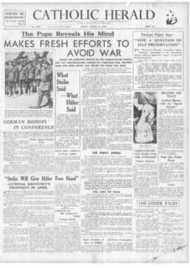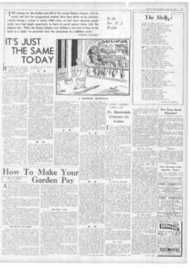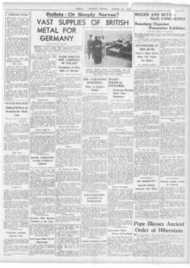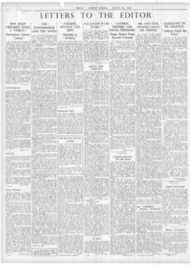Page 2, 25th August 1939
Page 2

Report an error
Noticed an error on this page?If you've noticed an error in this article please click here to report it.
Tags
Share
Related articles
Pius Xii: The Verdict Of The Eyewitnesses
Ten Years Of Pius Xii's Pontificate
Pope Benedict Defends Role Of Wartime Pontiff
The Maligned But Mighty 'representative' To Whom All Of...
In Ten Months
The Pope Has Worked From The Very First Day Of His PorLtificate To Secure Peace
NO MAN LIVING HAS WORKED HARDER IN THE LAST FEW MONTHS TO BRING PEACE TO THE TROUBLED CONTINENT OF EUROPE THAN POPE PIUS XII.
This newspaper has compiled a full list of his pronouncements since the day following the announcement of the Pope's election, from which it will be seen that since March 2 of this year there have only been isolated weeks in which the Holy Father has not spoken his mind on the vital question of a lasting and logical peace.
March 2. Cardinal Eugenio Pacelli (Papal Secretary of State) is elected Pope Pius XII.
March 3. The new Pope's broadcast to the world (Dum Gravissimum): " . . . We invite all men to have peace in their consciences ... and, lastly, to have peace between nations by the interchange of fraternal assistance, by friendly collaboration and cordial understandings, for the sake of the higher interests of the great human family."
March 15. Annexation of Bohemia and Moravia by Germany.
March 16. Vatican-Polish Agreement relative to certain lands that had been seized by Czarist Russia.
March 27. Osse,rvatore Romano urges that a peaceful settlement of Halo-French differences can be secured.
April 7. Italian invasion of April 8. Report of coming resumption of diplomatic relations between the Vatican and Uruguay (broken off in 1910).
; April 9. The Pope's Easter Sunday sermon in St. Peter's :
" There cannot be that ordered tranquillity which constitutes peace when often men of the sante country are divided against one another in quarrels of party or of interest. Nor can there be peace if, between the nations, too, there is often lacking that mutual understanding which alone can encourage and impel the people along the enlightened ways of civil progress, and if solemnly sanctioned treaties and the pledged word have lost that security and that value which are the indispensable bases of reciprocal confidence, and without which the ardently desired material and moral disarmament becomes with each passing day less attainable."
April 20. The Pope's request (in a letter to the Cardinal Secretary of State) for a Crusade of Public Prayers during May for Peace throughout the world.
April 28. Herr Hitler's speech, abrogating the British Naval Treaty of 1935 and the Polish Treaty of 1934.
MAY
May 3. Osservatore Romano: The Danzig question raises the whole issue of the balance of power in Europe. With Danzig in German hands, Poland and Rumania and the Balkans would follow suit. The fact that Italy constituted the other end of the Axis did not affect the question of the balance of power-any predominance was a danger to friends as well as eaemies. Moreover, no hegemony in Europe could exist without giving rise (as past history showed) to a coalition against it.
May 5. Mgr. Orsenigo (Papal Nuncio to Germany) has an interview with Herr Hitler before leaving for Rome.
May 7. The Pope broadcasts a message to the Eucharistic Congress at Algiers calling for universal prayers for peace throughout May.
May 9. First reports in the Press of a Papal Peace Plan. In particular, News Chronicle and Rvening News.
The plan-a Five-Power Conference (Germany, Poland, France, Italy and Great Britain). Reported that Mgr. Godfrey (the Apostolic Delegate to Great Britain) had conveyed the plan to Lord Halifax (Foreign Secretary) during the week-end, May 6-7.
The Vatican denies any plan, or any idea of a conference, but admits that the Pope is working actively for peace.
May 12. The Pope receives the Prince Regent of Yugoslavia and his Consort.
May 13. The Tablet : " The Papal initiative has not at present gone further than the sounding of certain Governments and a hypothetical expression of the Pope's willingness, if it is thought the best method of proceeding, to hold a conference under the neutral Ft gis of the Vatican. . .."
May 16. The Pope receives Mgr. Duca (Papal Nuncio to Italy).
May 19. The Daily Mail reports a meeting in the Pope's library on the 17th between the Pope and M. FrangoisPoneet (French Ambassador) and the Pope and Count Pignatti di Costuza (Italian Ambassador), both envoys being seen also by Cardinal Maglione (Papal Secretary of State). The Embassies report, however, that the audiences were on Monday the 15th (French) and Tuesday the 16th (Italian), and that both were routine visits.
The CATHOLIC HERALD confirms intense diplomatic activity at the Vatican; hints at the possibility of an Encyclical on peace; and continues: "At the moment it appears that all reports of failure are not only premature, but based in part on a misunderstanding of the nature of the Pope's action. . . . His action has been limited to ascertaining the points of view of the various Governments, and, possibly. putting forward concrete suggestions for the settlement of the Danzig and Franco-Italian disputes."
May 27. Thr.' Tablet reports an address by the President of the French Senate (M.. Henri Berenger) on May 19, In which he asserted that the Vatican did in fact propose (on May 7) an international conference, and " that the idea was, for some reason unspecified, turned down by the French."
JUNE
June 2. . The Pope's address to the Sacred College of Cardinals on his work for peace: " in a world of disputes and divisions, of conflicts of feeling and of Interests, of exalted ideas and haughty ambitions, of fear and of daring, amid a humanity which seems almost unable to make up its mind whether it should recognise and entrust the primacy of action and the decision of its own destiny to the sword or to the noble reign of law and reason.
" At a moment which appeared particularly grave-at the beginning of last month-we thought it timely, after mature deliberation, to make known to some of the statesmen of the great
European nations our fear lest the international dissension should degenerate into conflict.
" This step met in general with the sympathy of the Governments, we are glad to say, and after it had come to the attention of the people-through no co-operation on our part-it met with the gratitude of the people. . • .
"Nor do we wish to pass over in silence other information which we received regarding the sentiments and intentions of influential statesmen, to whom we are most grateful. . . . This circumstance has left open to us the way to further manifestations of our earnest solicitude."
June 6. The Daily Telegraph carries a denial from the Vatican of the rumours of the previous day. "It is declared that if Papal diplomacy were to enter into details of claims and concessions, it would run the risk of meeting with one of the greatest failures in its history. . . . At the present moment the Pontiff's policy is to intercede with responsible heads of Governments without entering into details or discussing
outstanding problems. . I am able to say that in his continual appeals the Pope is far more concerned with the people's interests than with the interests of their Governments." The Pope received Mr D'Arcy Godolphin Osborne, the British Minister.
June 14. Admiral Horthy, the Regent of Hungary, in his speech at the opening of the Hungarian Parliament, expresses the hope that the Pope-" the Power who stands above all worldly strife "would convene a, peace conference for the settling of European affairs.
June 15. M. Sider leaves Bratislava to take up his appointment as Slovak Minister to the Vatican.
June 16. Mgr. Cortesi (Papal Nuncio in Warsaw) is received by the Polish President (Dr. Moseicki), having seen Colonel Beck (Polish Foreign Minister) on each of the two previous days.
June 17. The Pope receives the credentials of the new Bolivian Minister to the Vatican (Dr. Gabriel Gosalvez) and in his reply says: " No people that does not wish to see itself condemned to remain behindhand in material and cultural progress can evade the necessity of seeking a solution to the urgent problems of these new times.... No Christian country may evade the fundamental law of sacrifice, so long as the public authorities respect the sacred and inviolable limits of the divine law."
June 18. Mgr. Cortesi (Papal Nuncio to Poland) loaves Warsaw for Rome, until the beginning of August.
The Italian Sunday evening broadcast In English said that tension between Poland and Germany bad eased owing to Papal intervention.
June 22. The Times Rome Correspondent writes that the recent Papal efforts have failed, but: ". . . The efforts of the Holy See in the cause of peace will not be abandoned, but it is emphasised that the less there is said about them the more likely they are to achieve sonic success."
June 24. The Daily Telegraph reports the appointment of a new Polish Ambassador to the Vatican (Dr. Kazimierz Papee)-the post baying been vacant since 1937.
June 27. Mgr. Cortesi (Apostolic Nuncio to Warsaw) is received by the Pope.
June 30. The CATHOLIC HERALD states that many Nuncios are reporting to the Vatican at the present time-including those to the Argentine, Japan and the U.S.A. The German Ambassador to the Holy See had had an audience-the first visit since the formal visit of congratulation after the Papal election in March.
JULY
July 7. The CATHOLIC HERALD insistsfrom its Rome Correspondent-that the Pope's efforts are continuing, that they are purely spiritual and not political, and that His Holiness will use " the ordinary diplomatic relations at his disposal, based upon absolute discretion. That is why it is impossible to get more details. . . ."
July 2.1. The Pope's departure to his summer residence at Castel Gandolfo is postponed.
July 14. The Pope sees the Apostolic Delegate to the United States (Mgr. Atnleto Cicognani).
There are in Rome now (to support the Papal Cabinet) the Secretaries to the Nunciatures in Paris, Bucharest, Spain, Belgrade, Great Britain. They have conferred with the Secretary for Extraordinary Affairs (Mgr. Domenico Tardini).
July '22. Cardinal Enrico Gasparri, bound for the U.S.A., has intensified the rumours, and he is said to be taking a reply to the President from the Pope,
July 24. The Pope leaves for Castel Gandolfo, having just received the credentials of the new Polish Ambassador (Dr. Papee).
July 28. The CATHOLIC HERALD reports a speculation that the Pope is preparing an Encyclical Letter dealing with the European situation.
AUGUST
August 9. Mgr. Orsenigo (Papal Nuncio to Germany) arrives in Rome and sees Cardinal Maglione (Papal Secretary of State).
The Osservatore Romano resumes
Continued at ,foot of next column. -after silence since March-particulars of German attacks on the Church.
August 18. The Osservatore Romano writes that " it seems matters have now (following the Salzburg talks) passed from the stage of Press polemics and entered that of diplomatic and military moves."
August 19. Pope's appeal for world peace-on the 25th anniversary of the death of Pope Pius X.
blog comments powered by Disqus














